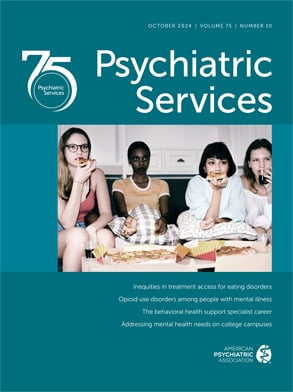Training Forensic Clinicians to Provide Patient-Centered Care
Client-centered care, which emphasizes collaboration between clinicians and empowered consumers, is a model of care that has made only minimal inroads in the forensic arena. Many forensic clinicians view themselves more as agents of social control than as health care workers, which results in environments of care in which incarceration trumps rehabilitation. Such a culture of control is difficult to change. Traditional training interventions, such as lectures, individual or group supervision, and staff development meetings, often prove ineffective in altering institutional cultures.
In collaboration with the Program for Recovery and Community Health at Yale University School of Medicine, we developed a novel training modality to modify the traditional values of a forensic hospital and introduce the values and principles of client-centered care. Focus groups with forensic inpatients helped identify salient features of their hospital experience that could then be used in the training. These men and women had spent time in the maximum-security hospital—acquitted as not guilty by reason of insanity—and had been transferred to a low-security hospital. The focus groups also suggested a series of scenarios that would allow trainees to experience aspects of institutional life that are unintentionally harmful to hospitalized individuals.
The training consisted of three major components: a role-play exercise, a video about discrimination, and a panel discussion with several past residents of our hospital. The role-play consisted of an introduction, the simulation, and debriefing exercises. The head of the hospital welcomed all trainees and described the schedule of the day. Trainees were assigned the role of high- or low-status patients (that is, with or without privileges) and participated in a 1.5-hour simulation on an empty hospital ward during which they acted the assigned patient roles. For example, the pseudo-patients were "processed" by a hospital police officer (asked to surrender jewelry, belt, and shoelaces), placed in an empty patient room, told to wait for the breakfast call, asked to line up for medication, and so forth. Trainees were then debriefed and given group exercises that promoted discussions of their experience.
Trainees then watched and later discussed the movie "Blue Eyes, Brown Eyes," a film on racial discrimination. The movie was chosen because it describes eloquently and movingly how the members of one group come to treat badly the members of another. A lunch followed, with continued dialogue among trainees, trainers, and hospital administrators. The afternoon offered a one-hour panel discussion with five former patients, who were invited to describe their hospital experience and comment on its positive and negative aspects. The panel was followed by group exercises that mixed former patients and staff.
In anonymously completed questionnaires most staff rated the training as very applicable to their work and as worthy of being recommended to their peers. The patient panel and the role-play exercise earned high marks. Trainees spontaneously wrote comments such as "It broke barriers" and "The opinions of staff and patients were equally meaningful." Many trainees reported feeling a strong sense of relatedness across the patient-staff boundary, gratitude toward patients for sharing their experience, pride and joy about the patients' improvement, and generally a greater sense of closeness with patients. Patients who participated reported feeling heard, empowered, and grateful for the opportunity, especially for the opportunity to recognize particularly meritorious staff and to denounce harmful practices, such as restraints. Their affect and self-reports suggested that this was a profoundly positive experience. The experiences were joyful and humanizing for all involved and illustrate the benefits of encouraging consumers of psychiatric services to share their experiences.
In addition to treatment and symptom management, client-centered care aims to promote service users' strengths, autonomy, power, and connections with others, along with their hopes, dreams, interests, talents, and skills. This can be accomplished only by developing empathy for the plight of the patients. Empathy and coercion are antonymic values—hence the fundamental cultural and conceptual clash between the existing forensic culture that emphasizes control and the principles of client-centered care. Such a contrast cannot be overcome by fiat. By seeing the longitudinal effects of treatment while being in a supportive small-group context, trainees were able reflect on their own contributions to the patients' progress and see the value of being informed by the patients' perspective and working "alongside" patients. This represents a significant paradigm shift—from focusing on control, safety, and coercion to accompanying patients on a journey toward improved symptom management and greater autonomy and quality of life.

